Key takeaways:
- Grief in hospital ministry entails navigating complex emotions like sorrow, confusion, and relief, with listening and connection being vital for support.
- Acceptance can emerge unexpectedly during grief, fostering unity among families and transforming relationships through open dialogue.
- Empathy plays a crucial role in healing, allowing individuals to feel less isolated and facilitating deeper connections between patients and healthcare providers.
- Utilizing grief counseling resources, including support groups and professional services, can significantly aid individuals in coping with loss and finding community.
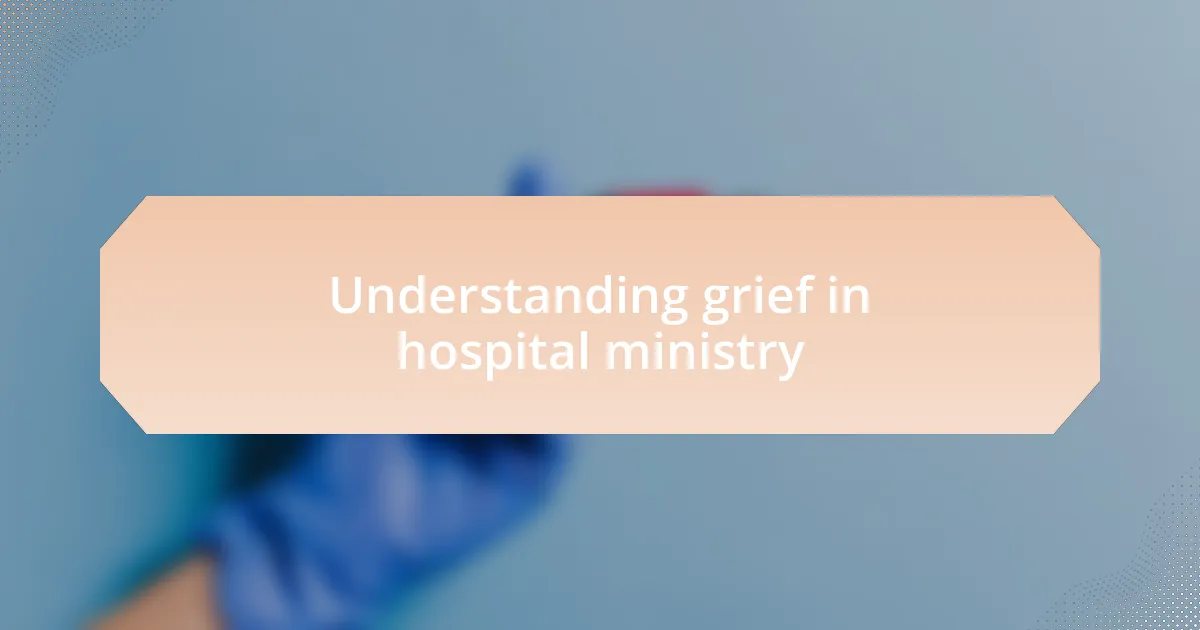
Understanding grief in hospital ministry
Grief in hospital ministry is a profound aspect that often surfaces during some of life’s most challenging moments. I remember one particular evening spent at the bedside of a patient who was nearing the end of their journey. As family members surrounded the bed, I could feel the weight of their grief in the air—a quiet yet powerful reminder of how fragile our human experiences can be.
When we think about grief in this context, it’s essential to recognize that it manifests not just as sorrow but also as confusion, anger, and even relief. For instance, I once spoke with a daughter who felt relief mixed with guilt after her mother’s passing. It made me ponder: How can we navigate these complicated emotions while offering comfort? The truth is, listening and creating space for those feelings is crucial.
The role of a hospital minister is to embrace the complexity of these moments, helping individuals and families process their grief. I’ve witnessed firsthand how simply holding a hand or offering a kind word can provide a flicker of hope amid despair. Have you ever considered how small gestures can become monumental in someone’s healing journey? In grief ministry, it’s those connections that often light the way toward acceptance.
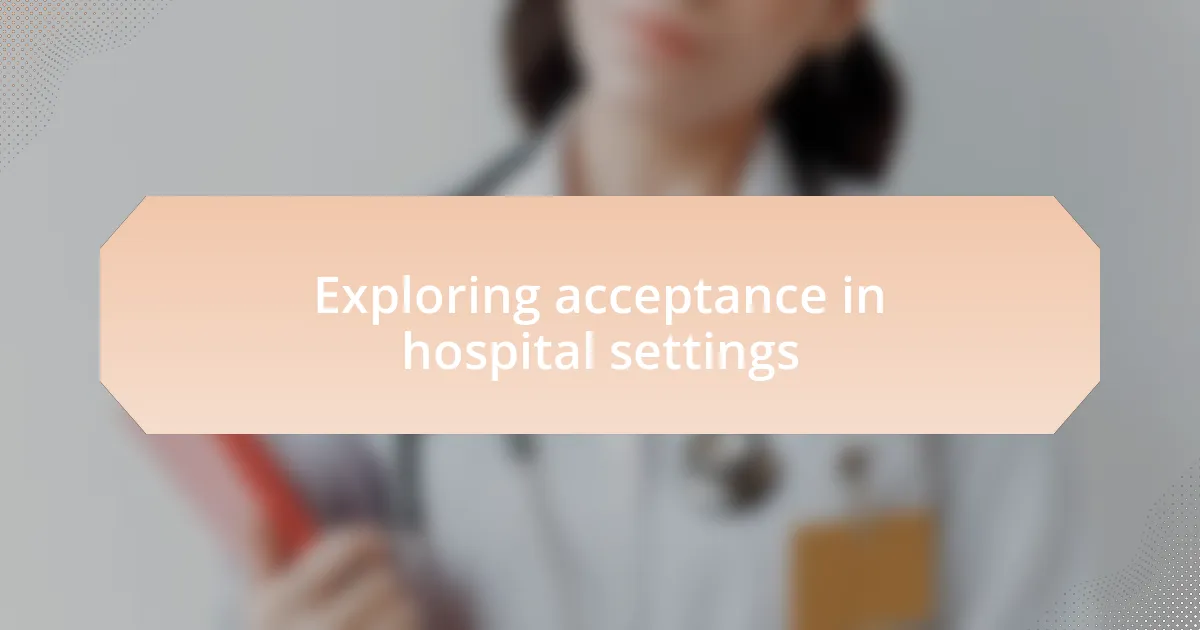
Exploring acceptance in hospital settings
Acceptance in hospital settings often unfolds in unexpected ways. I recall a moment with a father who had just been told his child’s prognosis was grim. Instead of despair, he asked, “What can I do to cherish this time?” It struck me how, in that moment of profound grief, he directed his energy toward meaningful memories instead of focusing solely on loss. Isn’t it remarkable how acceptance can pave the way for connection, even amidst heartache?
On another occasion, I facilitated a gathering for families facing similar challenges. As they shared their stories, a sense of unity emerged. I remember one mother who initially felt isolated but discovered solace in others’ experiences. It made me realize how powerful communal acceptance can be in a hospital environment. Have you ever found comfort in shared experiences? Often, these connections help individuals move forward, fostering a sense of understanding and peace.
Navigating acceptance in hospitals also involves acknowledging the changing dynamics of relationships. I encountered a patient whose partner was visibly struggling with the idea of impending loss. Rather than shying away from the topic, I encouraged open dialogue between them. This bravery to embrace difficult conversations transformed their relationship, allowing acceptance to blossom. Isn’t it incredible how such moments can deeply impact our journey toward healing?
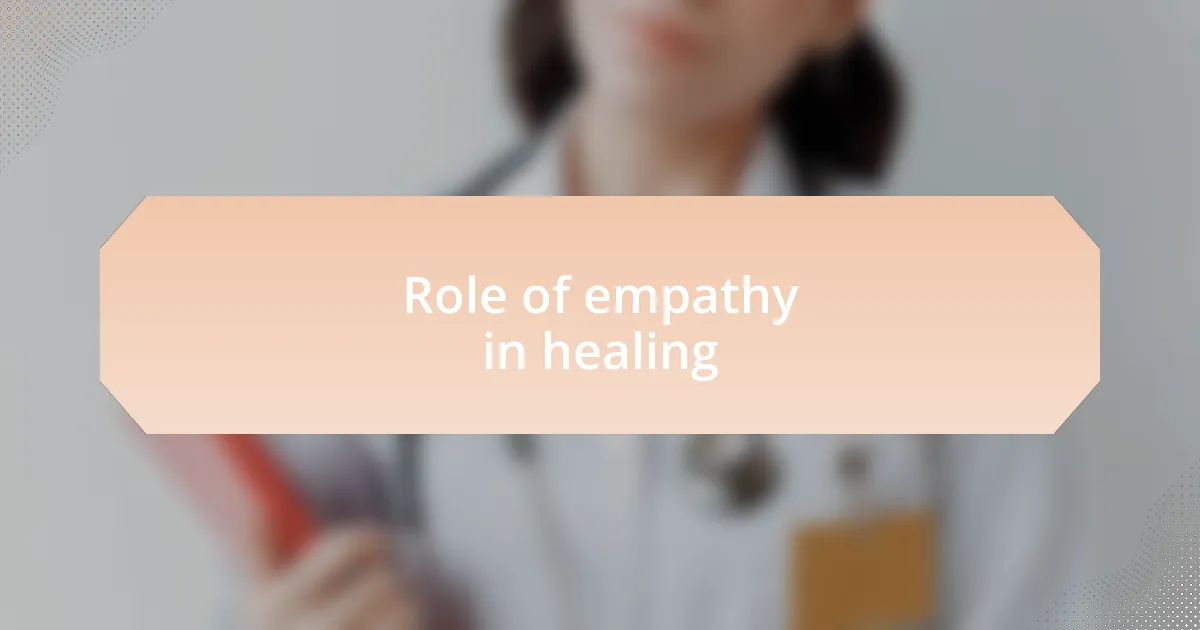
Role of empathy in healing
Empathy is a vital bridge in the healing process, especially in hospital environments where emotions run high. I recall a time when I sat with a grieving mother who felt utterly alone. As I listened to her heartbreak, I shared my own experiences of loss, and I noticed how this simple act of understanding eased her burden slightly. Isn’t it fascinating how empathy can create an instant connection, allowing pain to feel a bit more manageable?
In another encounter, I witnessed the power of a compassionate nurse who took a moment to hold a patient’s hand during a particularly difficult treatment. That small gesture spoke volumes, conveying understanding without words. It reminded me that healing often begins with someone simply acknowledging your pain and being present in that moment. Have you ever found solace in someone’s ability to just be there for you? I truly believe these acts of empathy can help individuals feel less isolated in their grief.
Finally, I’ve seen how empathy can facilitate deeper conversations between patients and healthcare providers. During a particularly challenging diagnosis, a doctor took the time to sit down and share not just the medical facts, but also his genuine concern for the patient’s emotional well-being. This approach not only informed the patient but also reassured and empowered them in their journey. How often do we overlook the emotional weight of a diagnosis? Empathy fosters an environment where healing can extend beyond physical treatments to address the heart as well.

Supporting families during grief
Supporting families during grief often goes beyond simple gestures; it requires a commitment to being present. I remember sitting with a family who had just lost a loved one. They were overwhelmed, and I could almost feel the heaviness in the air. As we shared memories, I noticed how recalling joyful moments provided them with a small anchor amidst the storm of grief. Have you ever found that talking about a loved one can bring both tears and smiles? In these moments, I realized that storytelling can be a powerful tool for healing.
Sometimes, practical support is just as crucial as emotional support. I once worked with a family struggling to navigate daily tasks while grappling with their loss. By simply offering to prepare a meal or help with errands, I saw how those small acts could lift a heavy burden. It made me reflect on how grief can make even the simplest tasks feel monumental. Isn’t it comforting to know that sometimes, our presence and support in practical ways can convey love and understanding?
Additionally, creating a space for families to express their feelings is indispensable in the grieving process. In one instance, I facilitated a group where family members could openly share their experiences and struggles. It was a safe haven, allowing vulnerability to flourish. Witnessing their connection and mutual support reminded me of how vital it is for people to feel they are not alone in their pain. Have you ever felt the relief of being in a room full of understanding souls? That sense of community can truly light the path toward acceptance and healing.
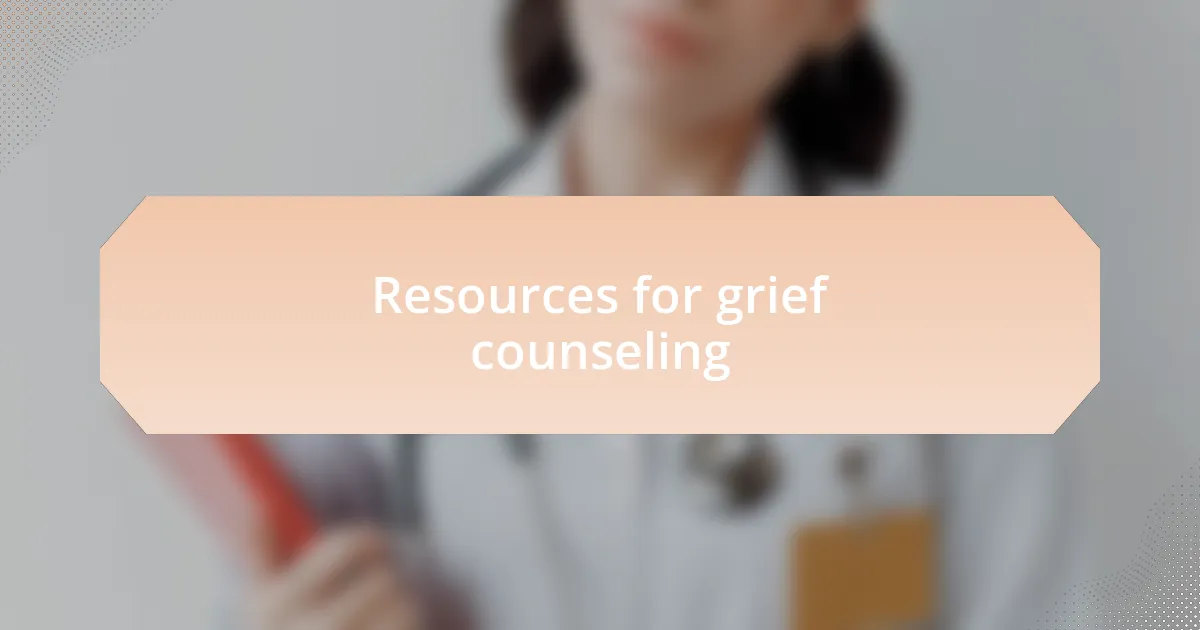
Resources for grief counseling
Grief counseling resources can greatly impact those navigating the difficult journey of loss. In my experience, local support groups are often a lifeline. I recall attending a session where members shared their stories in a circle, and it struck me how connected we felt through our shared pain. Have you ever experienced relief from knowing you’re not alone? Those moments can foster a sense of belonging amidst loneliness.
Online platforms have also become invaluable for grief counseling. I once guided someone through an app designed to facilitate conversation and reflection among users experiencing similar losses. They expressed how it felt freeing to share their thoughts with strangers who truly understood. Isn’t it fascinating how technology can bridge gaps and create community in our darkest times? These digital spaces allow for connection that transcends geographical boundaries.
Professional counseling services are crucial resources for those seeking deeper guidance. I remember referring a member of my community to a grief counselor when they were struggling to cope. The transformation they experienced was profound, as they learned coping strategies and how to express their emotions safely. Have you ever thought about how talking to a professional can sometimes make all the difference? The expertise of trained counselors often provides the tools needed to navigate the complex emotions of grief.
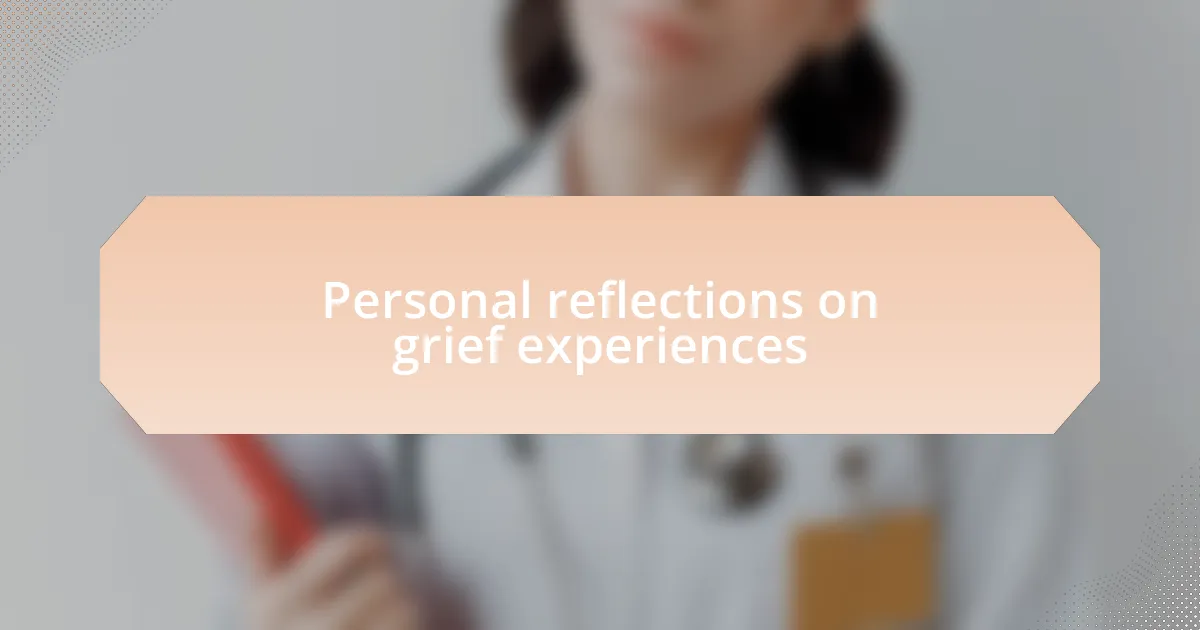
Personal reflections on grief experiences
Grief is a deeply personal journey, often marked by unexpected waves of emotion. I remember when I lost a close friend; the moment hit me like a ton of bricks, and I found myself engulfed in sadness that felt endless. Have you ever found yourself caught off guard by a memory that suddenly brings a flood of tears? Those memories can be bittersweet reminders of what we cherished.
As I moved through my grief, I noticed how crucial it was to allow myself to feel fully. One evening, while sitting alone with a cup of tea, I experienced a serene acceptance wash over me. It was as if the weight of my loss was both pressuring and freeing. I often reflect on how important it is to create space for sorrow while simultaneously embracing the joy that those loved ones brought into our lives. Isn’t it intriguing how acceptance doesn’t erase the pain, but rather, coexists with it?
In my experience, grief can also lead to a deeper understanding of ourselves and our connections with others. I recall a heartfelt conversation with a family member who had also faced significant loss. We exchanged stories of our loved ones, finding solace in shared laughter amid sorrow. That exchange revealed how grief can catalyze meaningful conversations, reminding us that while loss is painful, it also compels us to cherish our relationships even more. Have you ever noticed how grief can ignite a new appreciation for the people still in your life?
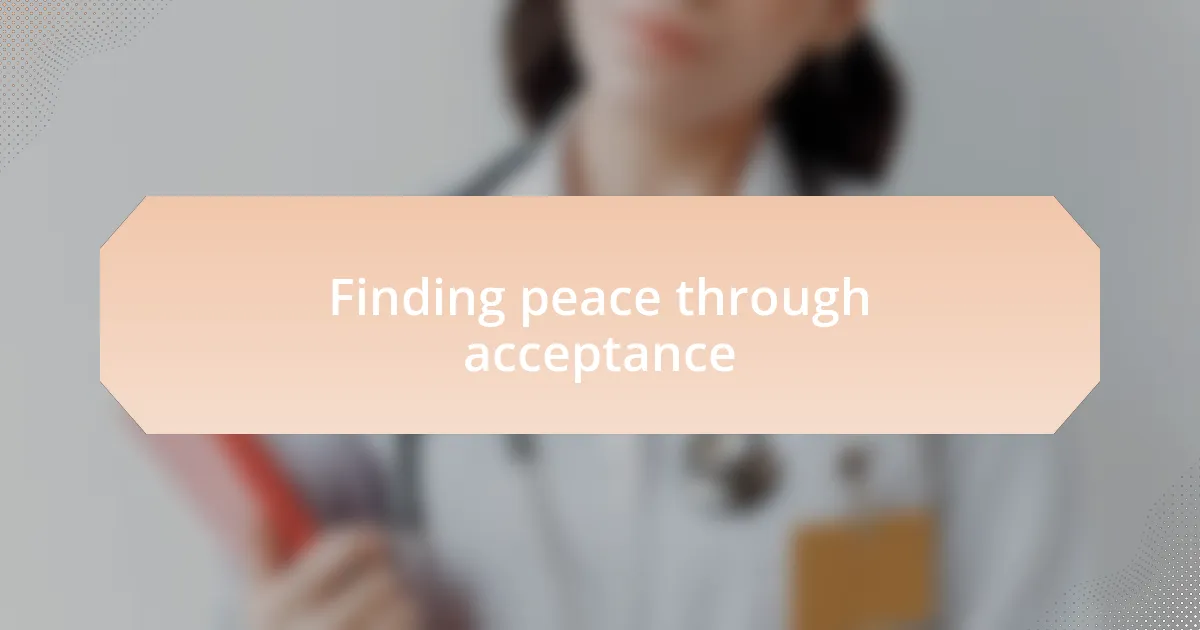
Finding peace through acceptance
Finding peace through acceptance often feels like a personal puzzle. I recall standing by a serene lake after losing a family member, watching the water ripple gently. In that moment, I realized that acceptance was not about forgetting; rather, it was about honoring their memory and finding the courage to embrace life without them.
There are days when I still feel the heaviness of grief in my chest. Yet, I’ve learned that acknowledging this weight transforms it into something softer. I often think about how acceptance enables us to reshape our relationship with loss. Isn’t it fascinating how by fully embracing our feelings, we create a pathway to inner peace, even amidst life’s chaos?
A while back, during a support group, a participant shared their journey of acceptance, and it struck a chord with me. They spoke of how they write letters to their lost loved ones, expressing everything from their daily triumphs to their lingering sorrow. This simple act not only allowed them to confront their emotions but also fostered a sense of connection. Have you considered how a similar practice might help you find peace in your experience of grief?